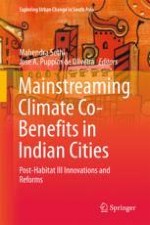2018 | OriginalPaper | Buchkapitel
4. Aligning Global Environmental and Local Urban Issues
verfasst von : Usha P. Raghupathi, Richa Sharma, Aastha Joshi
Erschienen in: Mainstreaming Climate Co-Benefits in Indian Cities
Verlag: Springer Singapore
Aktivieren Sie unsere intelligente Suche, um passende Fachinhalte oder Patente zu finden.
Wählen Sie Textabschnitte aus um mit Künstlicher Intelligenz passenden Patente zu finden. powered by
Markieren Sie Textabschnitte, um KI-gestützt weitere passende Inhalte zu finden. powered by
